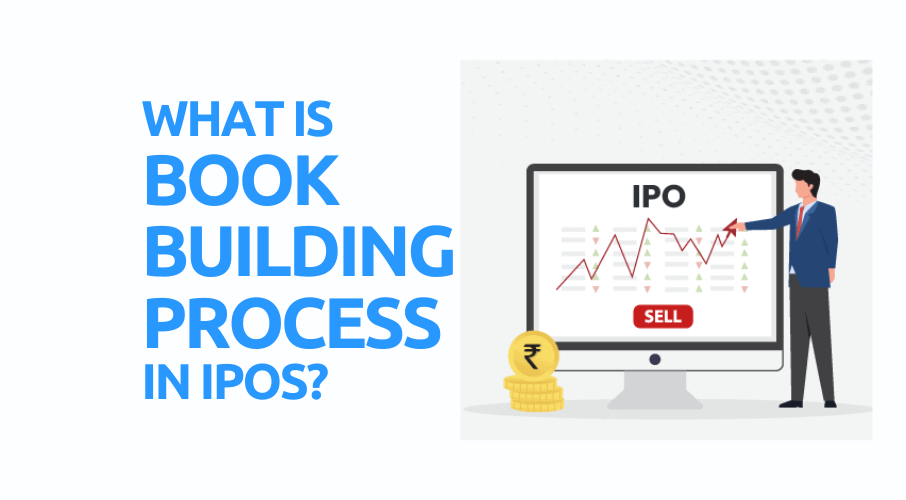When companies decide to go public through an Initial Public Offering (IPO), determining the right share price is crucial. One widely used method for setting this price is the Book Building process, which plays a key role in ensuring that new shares are priced accurately before being offered to the public.
In this article, we’ll walk you through the Book Building process, how it works, and its advantages, along with other essential details.
What is Book Building in an IPO?
The Book Building process is a mechanism used to help companies establish the right price for their shares when they go public.
Here’s how it works: the company sets a price range with a minimum and maximum limit. Potential investors then submit their bids within this price range. Once the bidding period is over, the company and its fund managers determine the final issue price, typically using a weighted average method. This final price becomes the offering price for the IPO.
How Does the Book Building Process Work?
The Book Building process unfolds in several stages:
Step 1: Hiring an Underwriter
Companies usually partner with investment banks, known as underwriters, to manage their IPO. The underwriter helps determine the size of the offering and sets a price range for the shares. Investors can then place their bids within this price range.
Step 2: Bidding
The underwriter, along with the company issuing the shares, invites investors to submit bids within the specified price range.
Step 3: Setting the IPO Price
An order book is maintained to record all investor bids. Based on these bids, the final IPO price is determined using a weighted average method.
Step 4: Allotting Shares
After the bids are received and the IPO price is set, shares are allotted to investors who have bid at or above the final issue price. Investors who bid higher than the cut-off price receive a refund for the excess amount.
Why Do Companies Prefer the Book Building Process?
Many Indian companies opt for the Book Building process for IPO pricing due to its numerous benefits:
Market-Driven Pricing
Rather than using a fixed price, the Book Building process relies on investor demand and market conditions. This ensures the IPO price reflects the market value, leading to a more accurate valuation.
Increases Investor Confidence
The transparency of the process boosts investor trust. Knowing that the market determines the price encourages more participation from investors.
Minimises Underpricing Risks
Fixed-price IPOs can lead to underpricing or overpricing, resulting in price fluctuations after the listing. The Book Building process helps mitigate these risks by aligning the issue price with market demand.
Efficient Share Allocation
Shares are allocated more strategically, with institutional investors playing a significant role in the distribution. This leads to a balanced and informed allocation of shares.
Regulatory Framework
The Securities and Exchange Board of India (SEBI) has clear guidelines for the Book Building process, ensuring fairness and transparency, which fosters greater trust among market participants.
Valuable Market Insights
During the Book Building phase, companies receive feedback from investors, which can provide valuable insights into market sentiment and investor expectations. This feedback can be used to guide future business strategies.
Advantages of the Book Building Process in IPOs
Here are some key advantages of using the Book Building method for IPO pricing:
1. Efficiency
The Book Building process is more efficient than fixed-price IPOs, as it reflects real-time investor demand.
2. Accuracy
This method allows companies to price their shares closer to their intrinsic value, reducing the risk of overpricing or underpricing.
3. Maximises Share Price
The process often results in companies achieving the highest possible price for their shares, as higher bids from investors can drive the final price up.
4. Quick Access to Capital
By using this process, companies can quickly secure capital, speeding up the fundraising process.
5. Clear Pricing for Retail Investors
Retail investors benefit from the Book Building process as the final issue price is set before shares are offered to them, ensuring transparency in pricing.
6. Reduces Marketing Costs
The demand-driven nature of the process reduces the need for extensive marketing. However, companies must still pay underwriters for their services.
The Bottom Line
The Book Building process is an efficient and transparent way for companies to price their shares during an IPO. By allowing investors to actively participate in the pricing, this method ensures that the shares are valued fairly and accurately. The process not only enhances transparency but also provides market-driven pricing that reflects real investor interest, helping companies to secure capital and manage post-IPO stability effectively.
Also Read:

Leave a Reply